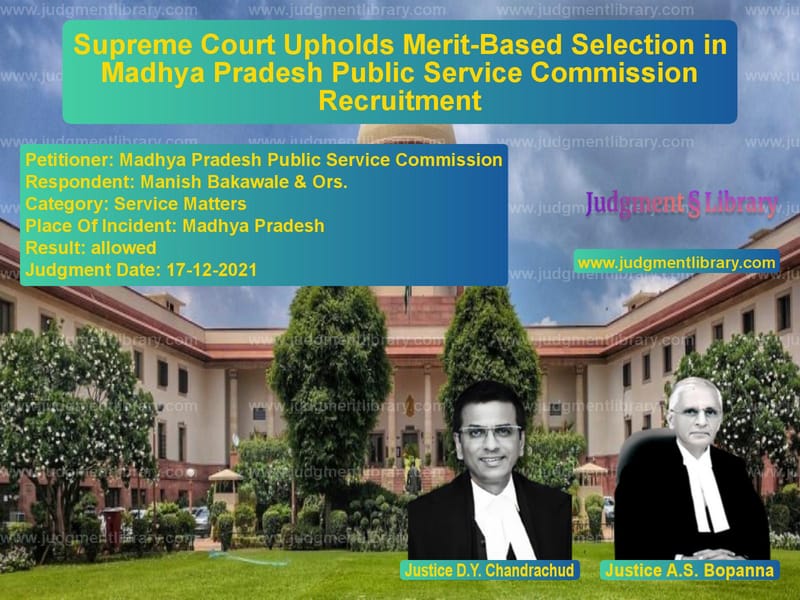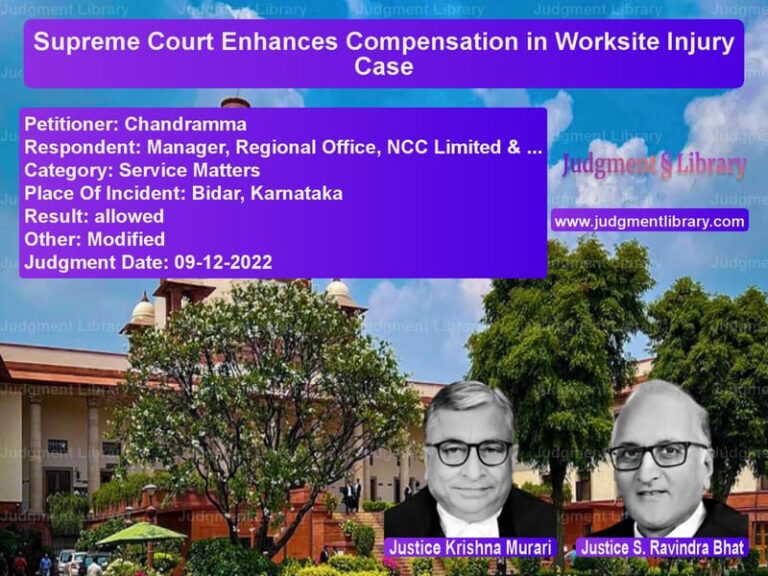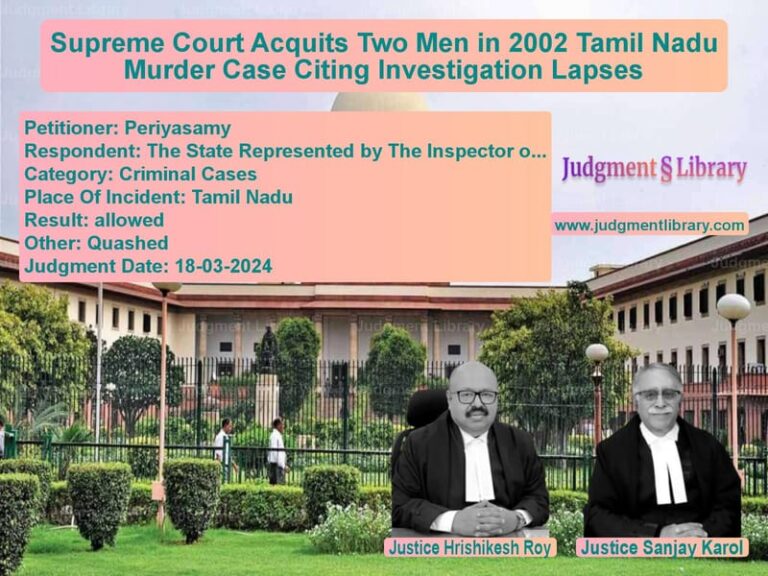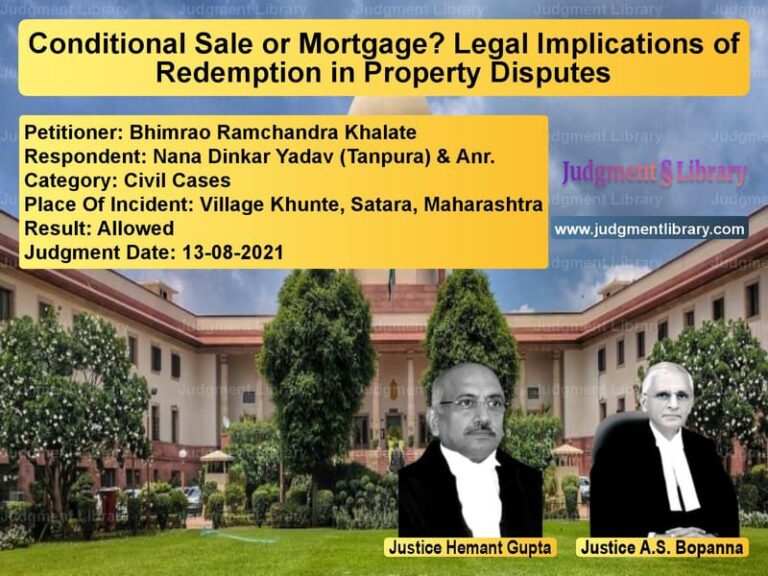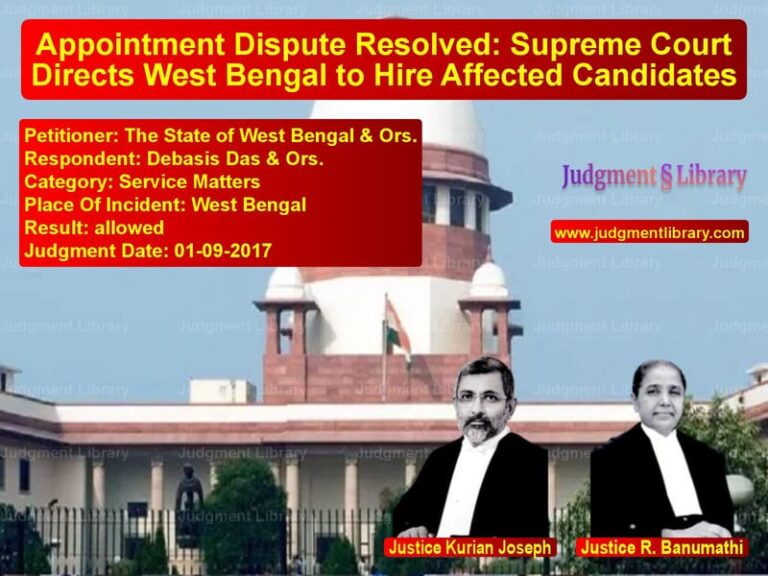Supreme Court Upholds Merit-Based Selection in Madhya Pradesh Public Service Commission Recruitment
The Supreme Court of India recently delivered a significant judgment in Madhya Pradesh Public Service Commission vs. Manish Bakawale & Ors., addressing a dispute related to government job recruitment and merit-based selection. The case involved the appointment of candidates for various government posts in Madhya Pradesh and the application of preference rules in recruitment. The Court upheld the principle that candidates must strictly adhere to eligibility criteria while selecting job preferences and cannot claim appointments if they do not meet the prescribed requirements.
Background of the Case
The Madhya Pradesh Public Service Commission (MPPSC) conducted the State Service Examination 2016 to fill multiple vacancies in different departments of the state government. The advertisement for recruitment was issued on March 17, 2016, specifying eligibility criteria, including educational qualifications, age limits, and physical measurements for certain positions.
Manish Bakawale, the respondent in this case, applied for the examination under the Scheduled Caste category and secured 892 marks out of 1575. His preference list included the posts of Deputy District Collector (first preference), Deputy Superintendent of Police (second preference), and Chief Municipal Officer (CMO) (sixteenth preference), among others.
Since his score was not high enough for his first preference (Deputy District Collector), he was considered for his second preference (Deputy Superintendent of Police). However, when he underwent the required medical test, it was found that his height was 162 cm—short of the 168 cm minimum required for the position. As a result, he was declared ineligible for the post.
Legal Dispute and High Court Decision
Following his disqualification from the Deputy Superintendent of Police post, Bakawale approached the Madhya Pradesh High Court, arguing that he should be considered for his next preferred position (CMO). He contended that another Scheduled Caste candidate with the same score (892 marks) had been appointed as CMO, so he should also be eligible for that post.
The High Court, first through a Single Judge and later affirmed by a Division Bench, ruled in favor of Bakawale. The Court directed MPPSC to consider him for the post of CMO or any other position from his preference list where he met the eligibility criteria.
Arguments Before the Supreme Court
Appellant (MPPSC) Arguments:
- MPPSC argued that its recruitment process strictly follows Rule 4(3)(c)(2) of the M.P. State Civil Services Rules, 2015, which states that if a candidate is selected in the main list for a post based on their preference, they cannot be considered for a lower-preference post.
- Bakawale had explicitly declared that he met all eligibility criteria for his preferred positions, including the height requirement for Deputy Superintendent of Police. However, since he failed to meet that criterion, his selection process was deemed complete, and he could not claim an alternate appointment.
- Allowing him to switch preferences post-selection would disrupt the recruitment process and disadvantage other candidates who had correctly opted for posts they were qualified for.
Respondent (Bakawale) Arguments:
- Bakawale argued that since he was ineligible for the Deputy Superintendent of Police position due to a technicality (height), his application should be reconsidered for his next preferred post.
- He claimed that strict enforcement of Rule 4(3)(c)(2) would lead to an unfair outcome, as he had secured the necessary marks for other positions.
- The High Court’s ruling was justified as it aimed to ensure fairness in the recruitment process.
Supreme Court’s Observations
The Supreme Court examined the legal provisions and recruitment rules in detail and made the following key observations:
- Strict Adherence to Eligibility Criteria: The Court held that a candidate must fulfill all conditions for a chosen preference at the time of application. Since Bakawale declared himself eligible for the Deputy Superintendent of Police post but later failed the height requirement, his claim for further consideration was invalid.
- Recruitment Rules Are Binding: The Court reinforced that Rule 4(3)(c)(2) is clear—once a candidate is placed in the main list for a selected preference, they cannot be considered for another position from their preference list.
- Declaration in Application Is Final: The Court pointed out that Bakawale had signed a declaration confirming his eligibility. If a candidate provides false or incorrect information, they bear full responsibility for the consequences.
- Administrative Efficiency: The Court noted that allowing post-selection changes in preferences would disrupt the recruitment process and create unfair advantages for some candidates over others.
Final Judgment
The Supreme Court allowed MPPSC’s appeal, setting aside the Madhya Pradesh High Court’s judgment. The key directives were:
- Bakawale’s petition was dismissed, and he would not be considered for any post since he had already been placed in the main list for his second preference.
- MPPSC was directed to ensure that recruitment rules were uniformly applied to all candidates to prevent similar disputes in the future.
- The judgment emphasized that recruitment authorities must strictly adhere to pre-declared eligibility criteria to maintain the integrity of government selection processes.
Key Takeaways
- Preference Selection Is Final: Candidates must carefully choose their job preferences, ensuring they meet all eligibility criteria before submission.
- Recruitment Rules Must Be Followed: Courts will uphold recruitment guidelines if they are fair, transparent, and clearly defined.
- No Post-Selection Changes: Once a candidate is placed in a main selection list, they cannot demand consideration for lower-preference posts.
- Ensuring Fairness for All Candidates: This ruling prevents unfair advantages and ensures a level playing field for all applicants.
This judgment reinforces the importance of maintaining discipline in the recruitment process and adhering to clear, merit-based selection rules.
Petitioner Name: Madhya Pradesh Public Service Commission.Respondent Name: Manish Bakawale & Ors..Judgment By: Justice D.Y. Chandrachud, Justice A.S. Bopanna.Place Of Incident: Madhya Pradesh.Judgment Date: 17-12-2021.
Don’t miss out on the full details! Download the complete judgment in PDF format below and gain valuable insights instantly!
Download Judgment: madhya-pradesh-publi-vs-manish-bakawale-&-or-supreme-court-of-india-judgment-dated-17-12-2021.pdf
Directly Download Judgment: Directly download this Judgment
See all petitions in Recruitment Policies
See all petitions in Public Sector Employees
See all petitions in Judgment by Dhananjaya Y Chandrachud
See all petitions in Judgment by A. S. Bopanna
See all petitions in allowed
See all petitions in supreme court of India judgments December 2021
See all petitions in 2021 judgments
See all posts in Service Matters Category
See all allowed petitions in Service Matters Category
See all Dismissed petitions in Service Matters Category
See all partially allowed petitions in Service Matters Category

